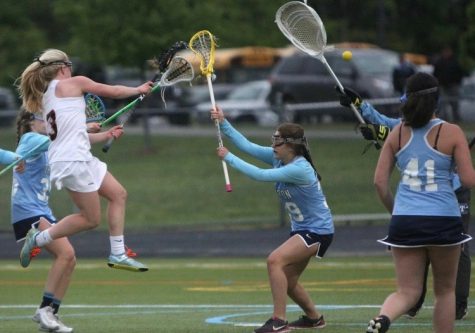Athletes! Eat Your Fruits and Vegetables!
December 11, 2018
In at least one point of every athlete’s career, they have been told to “eat healthy” or to “drink more water.” At the time, the athlete most likely rolled their eyes and brushed off the reminder. However, nutrition is a vital factor that determines the quality of an athlete’s performance. Many researchers have concluded that eating properly is crucial in order to maximize performance. High school athlete, Tatum Galuski, gives her insight on how she changes her habits to be a successful athlete. In addition, soccer coach, David Wood, gives his opinion on how he views nutrition and the role that it plays on the field.
Tatum Galuski is a junior at Ipswich High School. In addition to being a strong student and an active leader, Tatum is a three-sport athlete in school, as well as on several club lacrosse teams. When asked about her eating habits before a sports event, she responded with, “I try to eat a substantial breakfast and a lot of protein throughout the day.” She also adds that Kind Bars are her best friend. In addition, when asked what her preferred method of hydration is, she said, “I prefer to drink water because I have less of a chance of getting a cramp and I do not like taking in a lot of sugar.”
To get another perspective about the importance and impact of nutrition, we interviewed David Wood, a girl’s high school soccer coach, as well as a former soccer player at Bates College. When asked how he promotes the importance of a well-balanced meal to his team, Wood stated that “One option is coming up with a plan for team dinners. I usually encourage players to eat a dinner high in carbs and then follow up activity with a protein-rich meal. These recommendations also apply to team events. I try to dissuade players from eating sugary or otherwise unhealthy foods whenever I can.” As a coach, it is vital to encourage a healthy diet and to model this for the team. According to Wood, “I’ve always felt my best when I eat lots of fruit, vegetables, and lean meats, like chicken or fish. Protein is important to help build muscles and recover after a tough contest.”
Although the opinions of athletes and coaches provide insight into the importance of nutrition, the statistical evidence further highlights the seriousness of fueling your body with nutrients and liquids. Training and competition require large amounts of energy, which comes from carbohydrates, fats, and protein in your body. If an individual does not consume enough of these macronutrients in their diet, their body will not be able to perform at a peak level of performance. To maximize performance, Dr. Kathryn L. Beck suggests eating carbohydrates prior to an exercise event lasting longer than 90 minutes in order to increase glycogen levels. When an individual exercises, they deplete muscle glycogen. Glycogen is the primary fuel that muscles use for energy production. Therefore, increasing glycogen is important and one of the reasons that energy levels decrease when reducing carbohydrates. Not only are carbohydrates essential to performance, but fluids and electrolytes are also extremely important. During exercise, the body can lose several liters of water through sweating. According to MedlinePlus, “Teenagers and adults should replace any body weight lost during exercise with an equal amount of fluids.” Specifically, it is recommended that athletes drink about 16 ounces of water two hours before a workout. Finally, protein is an essential part of an athlete’s diet as it increases muscle growth and repairs body tissues after exercise.
Dr. Heather Guildes suggests an eating schedule for individuals planning to exercise to maximize performance level. First, Guildes suggests that three to six hours prior to exercise, the individual should consume food such as fruits, vegetables, bread, bagels, peanut butter, cheese, and yogurt. She then recommends that two to three hours prior to exercise, the individual should limit their eating to foods such as granola, yogurt, bagels, and peanut butter. Finally, one to two hours prior to exercise, Guildes advises the individual to eat small portions of fresh fruits and vegetables. Over the whole day, Guildes recommends drinking water.
Both the statistical evidence and personal accounts shed light on the importance of a healthy diet when exercising. Small changes in one’s diet can make a large difference on the field, court, or rink.


